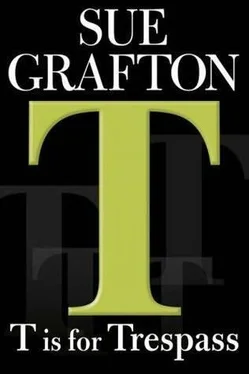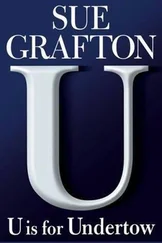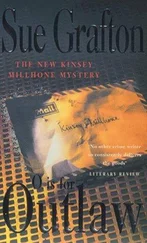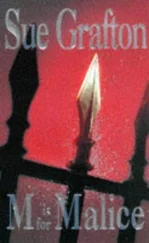“Why don’t you go ahead and call?”
“You think?”
“Why not? You might as well put it on his phone bill. Meanwhile, I’ll start on the kitchen. You can take his bedroom and his bath as soon as you’re done.”
I placed the call, but as is usually the case these days, I didn’t talk to a live human being. The woman on the answering machine identified herself as Melanie, no last name, but she wasn’t able to take my call. She sounded pretty cheerful for someone who told me at the same time just how sorry she was. I gave a brief account of her uncle Gus’s fall and then left my name, my home and office numbers, and asked her to return the call. I tucked the address book in my pocket, thinking I’d try again later if I didn’t hear from her.
I toured Gus’s house as Henry had. In the hall, I could smell the fug of mouse droppings and perhaps a mouse corpse of recent vintage trapped in a wall nearby. The second bedroom was filled with an accumulation of unlabeled cardboard boxes and old furniture, some of it quite good. The third bedroom was devoted to items the old man evidently couldn’t bring himself to toss. Bundles of twine-bound newspapers had been stacked head-high, with aisles laid out between the rows for easy access in case someone needed to get in and collect all the Sunday funnies from December of 1964. There were empty vodka bottles, cases of canned goods and bottled water sufficient to withstand a siege, bicycle frames, two rusted lawn mowers, a carton of women’s shoes, and three stingy-looking TV sets with rabbit-ear antennas and screens the size of airplane windows. He’d filled an old wooden crate with tools. An old daybed was buried under jumbled mounds of clothing. An entire set of green-glass Depression-era dinnerware was stacked on a coffee table.
I counted fifteen ornate picture frames laid up against one wall. I flipped the frames forward and peered at the paintings from above, but I didn’t know what to make of them. The subject matter was varied: landscapes, portraits, one painting of a lush but drooping bouquet, another of a tabletop adorned with cut fruit, a silver pitcher, and a dead duck with its head hanging off the edge. The oil on most had darkened so much it was like looking through a tinted window. I know nothing about art, so I had no opinion about his collection, except for the dead duck, which I thought was in questionable taste.
I got busy in the bathroom, thinking to get the worst of it out of the way. I disconnected my emotional gears, much as I do at the scene of a homicide. Revulsion is useless when you have a job to do. For the next two hours, we scrubbed and scoured, dusted and vacuumed. Henry emptied the refrigerator and filled two large trash bags with unidentified rotting foodstuffs. The cupboard shelves held canned goods that bulged along the bottoms, signaling imminent explosion. He ran a load of dishes while I tossed a mound of dirty clothes in the washer and ran that as well. The bedding I left in a heap on the laundry room floor until the washer was free.
By noon we’d covered as much ground as we could. Now that a modicum of order had been restored, I could see how depressing the house was. We could have worked another two full days and the result would have been the same-dinginess, neglect, a pall of old dreams hovering midair. We closed up the house, and Henry rolled two big garbage cans out to the curb in front. He said he’d get cleaned up and then hit the supermarket to restock Gus’s shelves. After that he’d call the hospital and find out when he was being released. I went home, took a shower, and got dressed for work in my usual jeans.
I decided I’d make a second try at delivering the Order to Show Cause to my pal Bob Vest. This time when I parked and crossed the street to knock on his door, I noticed two newspapers lying on the porch. This was not a good sign. I waited, on the off chance that I’d caught him on the john with his knickers down around his knees. While I stood there, I spotted a scratching post on one side of the porch. The carpeted surface was untouched as the cat apparently preferred to sharpen its claws by shredding the welcome mat. A sooty-looking cat bed was matted with hair, dander, and flea eggs, but no visible cat.
I went out to the mailbox and checked the contents: junk mail, catalogs, a few bills, and a handful of magazines. I tucked the pile under my arm and crossed the lawn to his neighbor’s house. I rang the bell. The door was answered by a woman in her sixties, cigarette in hand. The air around her smelled of fried bacon and maple syrup. She wore a tank top and pedal pushers. Her arms were scrawny and her pants rested loosely on her hips.
I said, “Hi. Do you know when Bob’s getting back? He asked me to bring in his mail. I thought he was getting home last night, but I see his newspapers haven’t been taken in.”
She opened the screen door and peered past me at his drive. “How’d he manage to rope you in? He asked me to mind his cat, but he never said a word about the mail.”
“Maybe he didn’t want to bother you with that.”
“I don’t know why not. He’s happy to bother me about everything else. That cat thinks he lives here as often as I look after him. Scruffy old thing. I feel sorry for him.”
I wasn’t crazy about Bob’s neglect of the cat. Shame on him. “Did he mention when he’d be home?”
“He said this afternoon, if you put any stock in that. Sometimes he claims he’ll be gone two days when he knows it’ll be a week. He thinks I’m more likely to agree to shorter absences.”
“Oh, you know Bob,” I said, and then held up the mail. “Anyway, I’ll just leave this on his doorstep.”
“I can take it if you like.”
“Thanks. That’s nice of you.”
She studied me. “None of my business, but you’re not the new gal he keeps talking about.”
“Absolutely not. I’ve got problems enough without taking him on.”
“Good. I’m glad. You don’t look like his type.”
“What type is that?”
“The type I see leaving his house most mornings at six A.M.”
When I got to the office, I put a call through to Henry, who brought me up to date. As it turned out, the doctor had decided to keep Gus an extra day because his blood pressure was high and his red blood cell count was low. Since Gus was spaced out on pain medication, Henry was the one who dealt with the discharge planner in the hospital social services department, trying to find a way to accommodate Gus’s medical needs once he got the boot. Henry offered to explain to me the intricacies of Medicare coverage, but it was really too boring to take in. Beyond Part A and Part B, everything seemed to have three initials: CMN, SNF, PPS, PROs, DRGs. On and on it went in that vein. Since I wouldn’t have to navigate those rapids for another thirty years, the information was simply tedious. The guidelines were diabolically cunning, designed to confuse the very patients they were meant to educate.
There was apparently a formula that determined how much money the hospital could make by keeping him for a specified number of days and how much the same hospital could lose by keeping him one day longer. Gus’s dislocated shoulder, while painful, swollen, and temporarily debilitating, wasn’t considered serious enough to warrant more than a two-night stay. He was nowhere close to using up the days allotted him, but the hospital was taking no chances. On Wednesday, Gus was discharged from St. Terry’s to a skilled nursing facility, otherwise known as an SNF.
Rolling Hills Senior Retreat was a rambling one-story brick structure on a tenth of an acre without a hill of any sort, rolling or otherwise. Some attempt had been made to tart up the exterior by adding an ornamental birdbath and two iron benches of the sort that leave marks on the seat of your pants. The parking lot was a stern black and smelled as though the asphalt had just been redone. In the narrow front yard, ivy formed a dense carpet of green that had swarmed up the sides of the building, across the windows, and over the edge of the roof. In a year, the place would be covered by a jungle of green, a low amorphous mound like a lost Mayan pyramid.
Читать дальше












